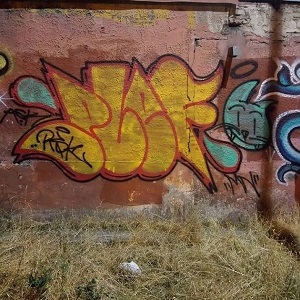Studies
Vocation for the popular in contemporary artistic activism: themes, languages and dilemmas

Published 2019-12-11
How to Cite
Verzero, L., & Manduca, R. (2019). Vocation for the popular in contemporary artistic activism: themes, languages and dilemmas. ENCUENTROS LATINOAMERICANOS (Segunda Época) ENCLAT ISSN 1688-437X, 3(2), 149–164. https://doi.org/10.59999/3.2.472
Abstract
In the last five years, several “artivist” (Delgado, 2013) collectives have emerged in Argentina. These groups are mainly made up by young people, mostly from the urban middle classes and they propose new ways of grouping and new ways of impacting micropolitically in the renewed neoliberal context through the artivist actions. Many of them hierarchize theatrical and performative procedures in their work. In this paper, we will focus on a specific intervention (Project 10/52) by Colectivo Fin de Un Mundo. We will analyze its aesthetics, its narratives and the way they are articulated in what we have defined as a “willing for the popular”.
Downloads
Download data is not yet available.
References
COPLERMAN, E.; DUPRÉ, G. y otros (1969). Teatros y políticas. Buenos Aires: Ediciones de la Flor.
BAJTIN, M. (1994). La cultura popular en la Edad Media y el Renacimiento. El contexto de François Rabelais. Buenos Aires: Alianza.
BODOC, L. (2012). Proyecto 10/52. Buenos Aires [inédito].
BOURDIEU, P. (1988). Los usos del pueblo. En: Cosas dichas (pp. 152-157). Buenos Aires: Gedisa.
CARREIRA, A. (2017). Teatro de invasión. La ciudad como dramaturgia. Córdoba: Ediciones DocumenA/Escénicas.
DA MATTA, R. (1979). Carnavais, malandros e heróis: para uma sociologia do dilema brasileiro. Río de Janeiro: Zahar.
DELGADO, M. (2013). Artivismo y pospolítica. Sobre la estetización de las luchas sociales en contextos urbanos. QuAderns-e. Institu Catalá d’Antropologia, 18 (2), 68-80. Recuperado de https://www.raco.cat/index.php/QuadernseICA/article/view/274290
ESPOSITO, R. (1998/2003). Communitas. Origen y destino de la comunidad. Buenos Aires: Amorrortu.
EXPÓSITO, M.; VIDAL, A. Y VINDEL, J. (2012). Activismo artístico. Red Conceptualismos del Sur, Perder la forma humana. Una imagen sísmica de los años ochenta en América Latina. Catálogo de exposición. Madrid: Museo Nacional Centro de Arte Reina Sofía.
KUSCH, R. (2012). El pensamiento indígena y popular en América y la negación del pensamiento popular. Rosario: Editorial Fundación Ros.
MAURO, K. (2019, enero). Reflexiones en torno a una estética popular en el teatro argentino» en Everba. Revista de estudios de cultura (pp. 19-27). Buenos Aires-Berkeley.
MIGNOLO, W. (2010). La colonialidad: la cara oculta de la modernidad. En: Breitwieser, S. (Coord.). Modernologías: artistas contemporáneos investigan la modernidad y el modernismo (pp. 39-49). Barcelona: MACB.
PROAÑO GÓMEZ, L. (2013). Teatro y estética comunitaria. Buenos Aires: Biblos.
TOBAR, J. (2016, diciembre). Carrozas carnavalescas. Revista Credencial. Recuperado de http://www.revistacredencial.com/credencial/historia/temas/carrozas-carnavalescas
BAJTIN, M. (1994). La cultura popular en la Edad Media y el Renacimiento. El contexto de François Rabelais. Buenos Aires: Alianza.
BODOC, L. (2012). Proyecto 10/52. Buenos Aires [inédito].
BOURDIEU, P. (1988). Los usos del pueblo. En: Cosas dichas (pp. 152-157). Buenos Aires: Gedisa.
CARREIRA, A. (2017). Teatro de invasión. La ciudad como dramaturgia. Córdoba: Ediciones DocumenA/Escénicas.
DA MATTA, R. (1979). Carnavais, malandros e heróis: para uma sociologia do dilema brasileiro. Río de Janeiro: Zahar.
DELGADO, M. (2013). Artivismo y pospolítica. Sobre la estetización de las luchas sociales en contextos urbanos. QuAderns-e. Institu Catalá d’Antropologia, 18 (2), 68-80. Recuperado de https://www.raco.cat/index.php/QuadernseICA/article/view/274290
ESPOSITO, R. (1998/2003). Communitas. Origen y destino de la comunidad. Buenos Aires: Amorrortu.
EXPÓSITO, M.; VIDAL, A. Y VINDEL, J. (2012). Activismo artístico. Red Conceptualismos del Sur, Perder la forma humana. Una imagen sísmica de los años ochenta en América Latina. Catálogo de exposición. Madrid: Museo Nacional Centro de Arte Reina Sofía.
KUSCH, R. (2012). El pensamiento indígena y popular en América y la negación del pensamiento popular. Rosario: Editorial Fundación Ros.
MAURO, K. (2019, enero). Reflexiones en torno a una estética popular en el teatro argentino» en Everba. Revista de estudios de cultura (pp. 19-27). Buenos Aires-Berkeley.
MIGNOLO, W. (2010). La colonialidad: la cara oculta de la modernidad. En: Breitwieser, S. (Coord.). Modernologías: artistas contemporáneos investigan la modernidad y el modernismo (pp. 39-49). Barcelona: MACB.
PROAÑO GÓMEZ, L. (2013). Teatro y estética comunitaria. Buenos Aires: Biblos.
TOBAR, J. (2016, diciembre). Carrozas carnavalescas. Revista Credencial. Recuperado de http://www.revistacredencial.com/credencial/historia/temas/carrozas-carnavalescas
